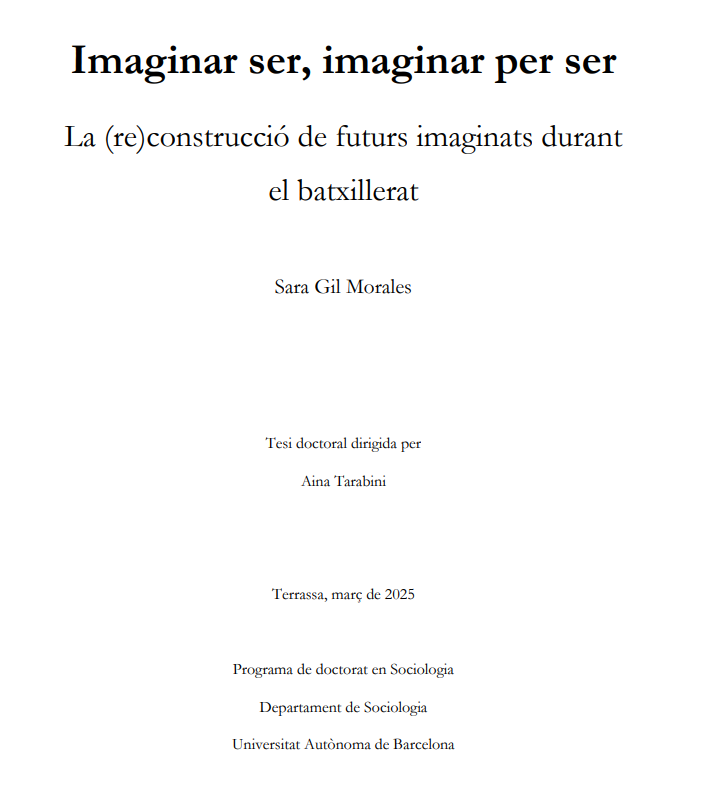Doctoral thesis defense of Sara Gil Morales
Doctoral thesis defense of Sara Gil Morales

Imagination plays a central role in life projects and social change, that is, in the production of the future. Imagining a future is therefore crucial for constructing future plans and aspirations and making the decisions necessary to achieve them. However, the capacity to imagine is socially produced within a historical, temporal, and cultural context, while also contributing to the production of social relations. In this sense, studying the construction and reconstruction of imagined futures is essential in terms of social justice, as it reveals the scenarios that individuals consider possible and desirable, as well as the unequal resources they use to imagine them. The process of imagining the future intensifies during key life stages -such as youth- and critical moments -such as educational transitions- when individuals must make decisions that will shape their life trajectory. This is precisely the object of study of this thesis, which is based on the question: "How do young people (re)construct imagined and desired futures along academic upper secondary education , depending on their social position, identity, and study program?" To explore this question, the thesis aims to examine (1) the characteristics of young people's imagined and desired futures, (2) how they have constructed these futures, (3) what transformations occur throughout the academic upper secondary education , and (4) what strategies they use to face future uncertainties. To access this process, a longitudinal qualitative study was designed combining narrative techniques, both oral -interviews- and written -letters-. This study was carried out over the two years of the baccalaureate.The results of this thesis are grouped into three main blocks. First, it highlights how the imagined futures of young people consist of a vast number of interrelated images and meanings, which are conditioned by their social position, identity, and educational trajectory. Specifically, three elements sequentially structure young people's narratives: education, work, and family. Moreover, throughout these stages, the notion of a "good life" is configured, defining which of these futures are seen as appropriate and desirable. Secondly, the data analysis has identified four key elements in the process of constructing imagined futures: family occupations and lifestyles; the role of school as a space for discovery and experimentation, as well as identity construction; daily life activities as spaces of familiarization through "doing"; and the digital environment as a window to other "possible worlds". Thirdly, the study reveals the crucial role of capital structures, educational experiences, available opportunities, and the fields in which young people aspire to participate in holding or transforming their imagined futures. Likewise, it highlights how these factors influence the capacity and strategies that young people employ to face future uncertainties.Overall, this thesis provides new tools for understanding the processes of constructing and reconstructing imagined futures, as well as the factors and mechanisms involved. Furthermore, it underscores the complex relationship between elements that shape and influence young people's imagined futures and their role in educational transitions and transitions into adulthood. Additionally, it offers new perspectives for designing guidance and educational support policies that are sensitive to the needs of young people.
Date: 29/05/25
Place: Sala de Graus (Fac. Ciències Polítiques i Sociologia)
Hour: 15h